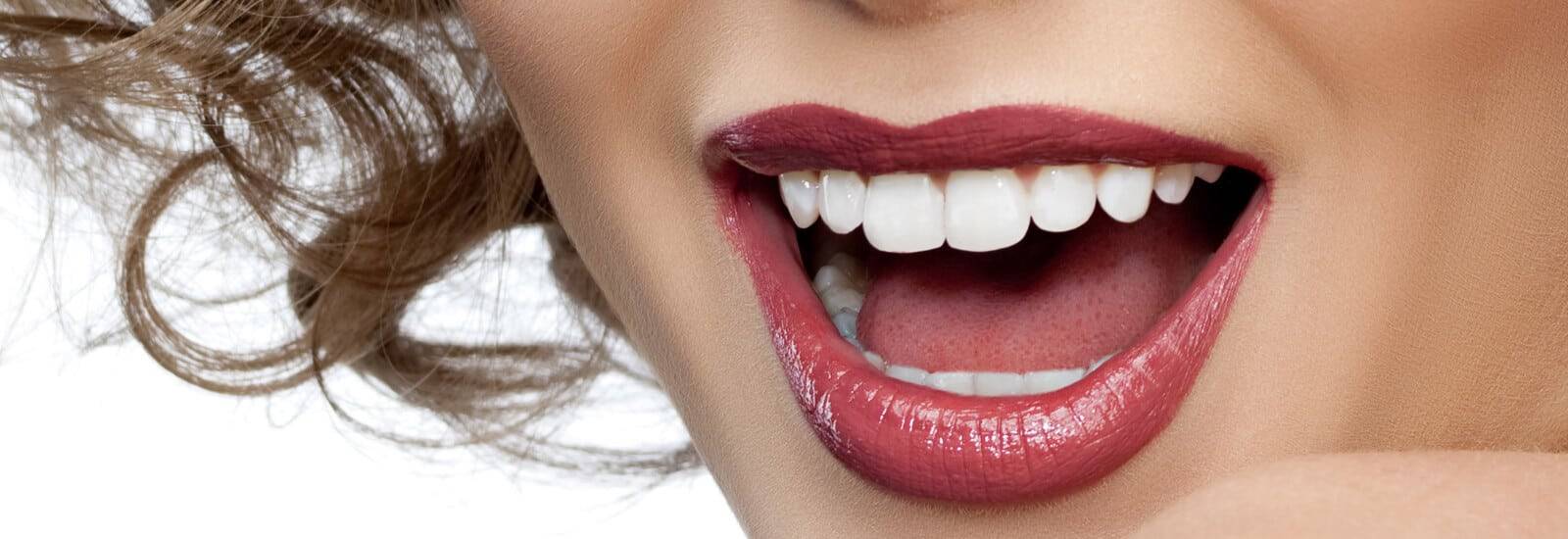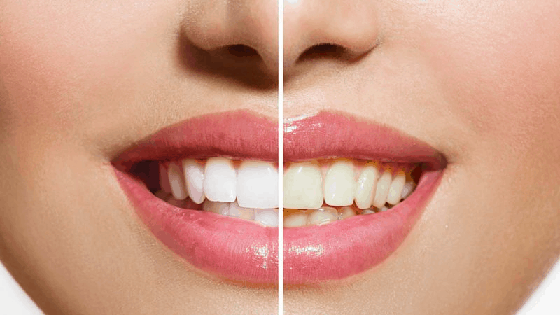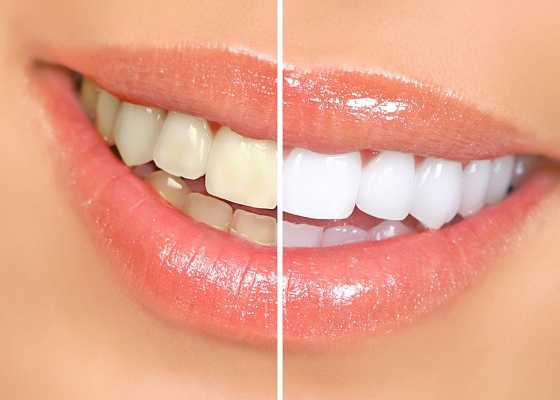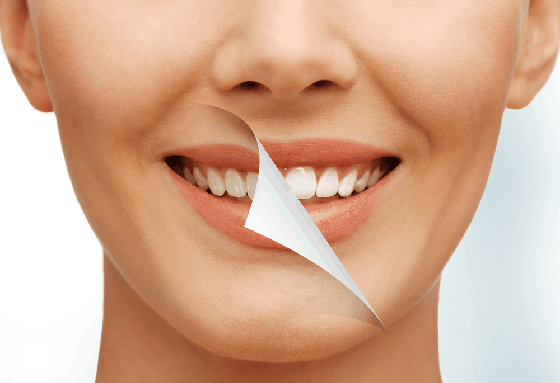Teeth Whitening
In Teeth whitening or bleaching, the discoloration of the teeth is done. This treatment helps to remove the stains from the stained teeth. Specific dental chemical agents are used by dental experts during the whitening process. Generally, 40 to 60 minutes are incurred for this treatment.

Talk to a Dentist Now!
Table of content
- What is Teeth Whitening?
- Why do I need to whiten my teeth?
- What is dental stain?
- What causes tooth discoloration in adults?
- What are the process of the treatment?
- What are the various types of whitening treatments available?
- Non-vital whitening:
- Vital whitening:
- How do I whiten my teeth at home?:
- In-office Whitening:
- Benefits of the treatment:
- When the treatment might not work?
- Oral care after the treatment:
- What kind of risks does it include?
- Who should avoid the whitening treatment?
- Keeping your treated white teeth in good condition
- When To Call a Professional?
- Teeth Whitening: Why You Should Talk to Your Dentist
What is Teeth Whitening?
It is a way of lightening the teeth by using a chemical agent that breaks down stain-producing chromogens on the surface of teeth. It is also called Bleaching since it’s done with a bleaching agent like Hydrogen Peroxide or Carbamide Peroxide.
Why do I need to whiten my teeth??
The reason for treatment differs from person to person. Like variations in our hair and skin color, tooth color is also different from one person to another. Indications include:
- Intrinsic tooth staining: Stains on Teeth
- Aesthetics: Makes Teeth look whiter thereby improving your smile.
- Fluorosis: Fluorosis causes pitting and yellow stains which can be made less evident by bleaching.
- Tetracycline staining: Tetracycline stains can be made less evident.
- Tobacco Staining: Stains due to tobacco can be made less visible by bleaching of teeth.

What is a Dental Stain?
Stains are discolorations on the surface of teeth that are caused by multiple reasons. It may affect a single tooth or multiple teeth. According to its formation, it may be categorized into the following two forms:-
- Extrinsic stains: It is the most common type of tooth discoloration on the external surface of the tooth. These stains usually occur due to the excessive consumption of certain types of foods & beverages. It affects the enamel which causes discoloration in the teeth. Habits like smoking and tobacco chewing are also responsible for external stains.
- Intrinsic stains: Intrinsic staining primarily occurs during the tooth development. Intrinsic stains are those that cannot be removed through mechanical measures such as debridement prophylactic stain removal.
You can consult Sabka dentist for a detailed answer to your problem.
What causes tooth discoloration in adults?
Extrinsic Staining:
- Smoking and tobacco chewing
- Increased frequency of drinking sugary and acidic liquids such as coffee, cola, tea, and red wine
- Poor oral hygiene that results in staining and calculus buildup
- Use of Mouthwash like Chlorhexidine, which can bind to tannins
Intrinsic Staining:
- Trauma to the tooth, results in staining as a result of pulp necrosis or internal resorption.
- Enamel Hypoplasia
- Fluorosis
- Amelogenosis Imperfecta
- Dentinogenesis Imperfecta
- Porphyria
- Staining due to Tetracycline
But apart from the above reasons, teeth color can change with advancing age and time. The color of the teeth is also determined by the thickness of the enamel. With age, enamel becomes thinner. The thinner enamel layer delivers the impression of yellow teeth, which should not be mistaken for staining.

What is the process of the treatment?
At your visit to the Sabka Dentist clinic, our dentist will examine your teeth closely and let you know if you need further treatment.
Our professional dentist will check the overall condition of the teeth, and the health of the teeth and will ensure the patient’s gums are healthy, post which our professionals will take this treatment further. At Sabka Dentist, dental check up is at Zero cost!
Cleaning the teeth will be the first step of your treatment process. Then they will put a rubber shield to protect your gums from caustic dental bleach. This is followed by applying the whitening solution. They will then apply the hydrogen peroxide-based whitening agent onto your teeth.
30-90 minutes shall elapse before the treatment is done. One may need up to one to three appointments at Sabka Dentist, depending upon the method used, how severe your stains are, and the extent to how white you want your teeth to be!
What are the various types of whitening treatments available?
Non-vital whitening:
This process is done for a tooth that had a root canal treatment. A root canal treated tooth can have intrinsic staining sometimes.
A bleaching agent (hydrogen peroxide or carbamide peroxide) is then placed inside the tooth and left for some time until the tooth achieves the desired color. Once done, Our dentist will remove it and will seal the tooth with a white (composite) filling.
Vital whitening:
This treatment is done for the natural, vital, and healthy tooth. The bleaching solution here is applied onto the vital tooth surface. This treatment is effective in lightening and brightening your teeth. It can be done by the dentist (In-Office) or by at-home technique.
How do I whiten my teeth at home?:
For an At-home whitening procedure, the dentist records impressions of upper and lower teeth. This helps to prepare custom mouthpieces that fit you well. A close fit ensures that the whitening agent remains in contact with your teeth. At home, one has to fill each mouthpiece with the provided whitening gel. The mouthpiece needs to be worn for several hours every day.
The optimal amount of whitening is achieved within a week or two. However, one may need to wear the mouthpiece for four weeks or longer for effective whitening. Whitening products over the counter may also be used.
However, they contain weaker whitening agents and whitening may thus take longer. The whitening agent is then applied as a gel placed in a mouthpiece or as a strip that sticks to your teeth. Over-the-counter mouthpieces fit less securely than the customized kind that the dentist provides.
In-office Whitening:
Dentists who whiten our teeth – managed bleaching may include in-office teeth bleaching treatments. In-office whitening involves the use of a more powerful whitening gel. A specialized light or laser is used to activate the gel and allow teeth bleaching to happen faster!
In-office whitening treatment takes around 30 to 90 minutes.1 to 3 appointments may be needed depending upon the method used, how severe your stains are, and how white you want your teeth to be! Different stains may respond differently to the teeth bleaching treatment.
After the whitening agent is applied by the dentist, a laser or light activator is used on the teeth. If one’s teeth are badly discolored, the dentist may also suggest continuing the teeth bleaching process at home for a few days or weeks.

Benefits of the treatment:
- Bright smile: Aesthetics is the priority of the patients for achieving white teeth. This treatment will brighten up the teeth and make them appear attractive.
- Removal of Stains and Discoloration: Tooth whitening will remove unaesthetic stains and discoloration from the tooth surface.
When the treatment might not work?
The fact that you have to remember about the treatment is it can only lighten the existing shade not give it a new color shade. Hence works on only natural teeth. It will not work on any set of ‘false’ teeth (prostheses) such as dentures, crowns, etc.
Oral care after the treatment:
- Keep your teeth white by decreasing the amount of drinking, smoking, or eating sugary, colored (turmeric, coffee, colas) items.
- Visit your dentist regularly once in 6 months, and when they call you back for the treatment.
- Maintain regular oral hygiene.
- Regular brushing and flossing are utterly important.
What kind of risks does it include?
Some patients may feel sensitivity in their teeth after the treatment for a couple of days. This can be resolved by a discussion with our dentist, and they will assist you with a proper solution.
Who should avoid the whitening treatment?
- Teeth Bleaching is not advised for children < 6 years.
- Teeth Bleaching treatment should be avoided for pregnant or lactating women.
Keeping your treated white teeth in good condition
Your eating, drinking, and oral cleanliness propensities can affect to what extent your teeth brightening results last. After you’ve finished any brightening treatment, your teeth are as yet powerless to recolor from refreshments like tea and espresso, and certain nourishments.
Flushing your mouth or brushing your teeth not long after eating or drinking can shield those sorts of staining specialists from subsiding into the outside of your teeth — and decline the opportunity for plaque to develop!
When To Call a Professional?
If you feel whitening of the teeth will benefit you, you can contact Sabka Dentist to seek and discuss the procedure further. You can make the appointment directly too by contacting us. Find your nearby clinic within our maps! Happiness begins with a smile and we will assist you to get your desired smile! To know about the cost of the treatment, please check the Price list here.
Teeth Whitening: Why You Should Talk to Your Dentist
Teeth bleaching can make teeth incidentally delicate – or be awkward for individuals who as of now have touchy teeth. At the point when utilized mistakenly, home packs can likewise prompt consumed – even briefly faded – gums. Tooth-brightening works best for individuals with yellow teeth and is less powerful for individuals with earthy-colored teeth.
If your teeth are dim or purple, tooth dying most likely won’t work by any stretch of the imagination. To be certain tooth-brightening merits your time and cash, converse with your dental specialist before you utilize an over-the-counter tooth brightening unit.
Teeth whitening is the process in which the stains, dark spots, brownish marks, etc. are cleaned from the teeth. Many people suffer from this kind of problem which makes them feel awkward. They find it difficult to smile and talk openly due to this situation.
Here, teeth whitening treatment is a better solution for removing the black spots and other brownish layers from teeth. They can make the teeth look whiter bringing a better shine on it. Considering a proficient teeth whitening services provider can help you to achieve the desired white shine on your teeth.
What are the different causes of the tooth discoloration?
- Intake of more liquids like coffee, tea, soft drinks, etc.
- Tobacco chewing & smoking
- Improper brushing & flossing activity
- Improper or avoiding mouth rinsing after eating the food
What are the different types of teeth whitening treatment?
Here are the two major types of the teeth whitening treatment:
1. Non-Vital Whitening
This type of treatment is usually done after the root canal treatment. Here, the staining happens particularly in the intrinsic part of the tooth. A bleaching agent like carbamide peroxide or hydrogen peroxide is used for teeth cleaning. After doing it, the tooth is sealed with suitable dental material.
2. Vital Whitening
This type of treatment is done for the healthy and natural teeth. A bleaching solution here is applied to the teeth.
What are some of the oral care to take after the treatment?
- Visiting the dentist’s office regularly after six months.
- Avoid unwanted food and drinks after the treatment process.
- Avoid brushing very hard for a few days after the treatment.
- Maintaining proper oral hygiene.
If you are looking for low-cost teeth bleaching cost in India then Sabka Dentist is a better choice for you. Sabka Dentist provides the best teeth whitening technique that can improve your smile.
Expert's Opinion
- Dr. Manan Dhulia Dental Director of Sabka Dentist says “Whitening will greatly enhance the smile. It is important to keep the treatment effect for a long time. He says if you follow good hygiene your smile will be bright always”.
- Dr. Rupali Gujar Dental Director of Sabka Dentist says “Whitening will enhance the smile and it is a widely accepted cosmetic treatment”.
- Dr. Reena Waghela Dental Director of Sabka Dentist says “Cosmetic treatment like teeth whitening will help people to get pearly teeth”.
Frequently Asked Questions
Are there any negative side effects of teeth whitening?
- Tooth Sensitivity: The most common side effect is tooth sensitivity. Sensitivity is directly related to the concentration of hydrogen peroxide. Postoperative care of using a fluoridated mouth rinse or ACP-CPP should be taken, to promote remineralization of the enamel surface.
- Gum irritation: This is possible if the bleaching agent or if the margins of an ill-fitting tray come in contact with unprotected gum tissue. Such lesions should be treated by copious rinsing with water. More severe ones should be treated with topical application of anesthetic gels.
If any of these side effects continue, then you should visit your dentist.
What is the teeth whitening cost?
At Sabka Dentist, the cost of teeth whitening procedures is Rs 13,500/-.
How long does it take to whiten teeth?
- In–office Technique: 30 minutes per appointment are required. 1 – 3 appointments may be required.
- At Home: 4 hours per session is required. The duration of treatment depends on the extent of discoloration. Results may show as early as 2 – 14 days or may take as long as 6 – 12 months.
How does whitening toothpaste work?
All toothpastes remove tooth surface stains since they contain mild abrasives. However, some whitening toothpastes also contain gentle polishing or chemical agents that provide additional stain removal effectiveness.
Whitening toothpaste can only aid in removing surface stains and does not contain bleach; over-the-counter and professional whitening contain carbamide peroxide or hydrogen peroxide that induces bleaching to lighten the teeth shade.
How long does teeth whitening last?
Teeth Whitening can last for 1 – 3 years. However, the change may also be permanent in some situations.
How to whiten teeth at home?
Following are the Over-the-counter and professional whitening agents to be used at home:
- Strips and Gels: The plastic whitening strips contain a layer of peroxide gel and are shaped to fit the buccal/labial surfaces of the teeth. They are recommended to be used twice daily for 30 minutes for 14 days to give effective results. However, specific whitening strip products will have their own set of instructions.
- Tray-based Teeth Whitening: The dentist will first take impressions of the upper and lower teeth and then prepare the trays. At home, the patient should brush their teeth before the use of these trays since surface debris can minimize the effective contact of the bleaching agent with the tooth surface. Then, the patient should place sufficient bleaching agent (10% carbamide peroxide) into the tray to cover the facial surfaces of the teeth. This tray should be worn for 4 hours for every session. After every teeth bleaching session, rinse off the bleaching agent from the tooth surface. Depending on the extent of tooth discoloration, the time duration to achieve the optimal result may vary.
Does Hydrogen Peroxide cause damage?
Hydrogen Peroxide can have an ischemic effect on skin and mucous membranes, thus causing a chemical burn. However, proper protection should be exercised to prevent direct contact of hydrogen peroxide with tissues. Within the concentration range of 5 – 35%, it can be employed for teeth whitening.
Is it possible to whiten your teeth in one day?
This depends on the extent of tooth discoloration. The in-office technique performed by the dentist will give faster results than the At-home technique.
About Author

Pursued her BDS degree From Bharati Vidyapeeth, Pune Dr. Preethi Nagrajan is a successful dentist. She completed her graduation in 2009. She is not only an enormous dentist but also accomplished her MBA in healthcare and hospital management from Tamil Nadu University in 2013. She has also acquired a Diploma in Laser and Implant dentistry from LALD. This paved the way for her to become a specialist in Painless Laser Treatment, endodontics, oral surgery, prosthodontics, periodontology, FMR, and smile designing. Her experience and knowledge have allowed her to publish numerous articles in various international journals. Dr. Preethi currently works as Dental Director at Sabka Dentist and has worked with the organization for over 8 years.








